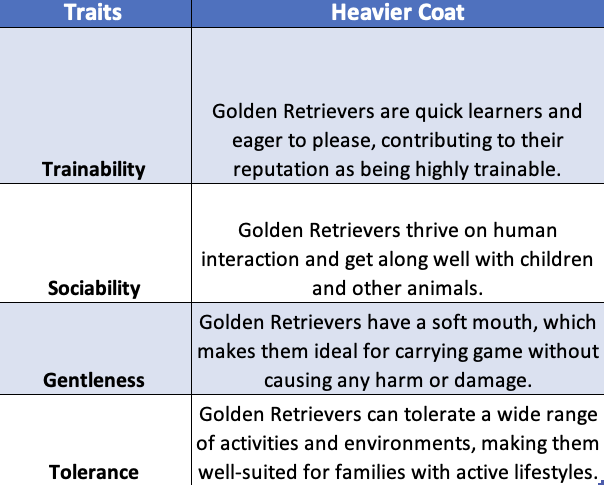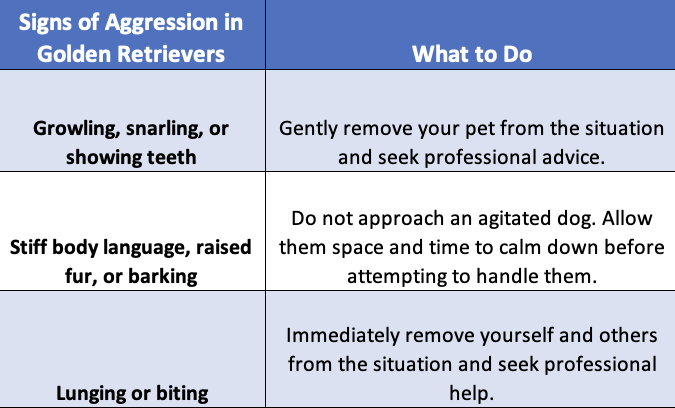Why are Golden Retrievers So Nice? (Could They Be Aggressive Too?)

Golden Retrievers are one of the most popular dog breeds in the world, known for their happy-go-lucky and friendly nature. From being the ideal family pet to working as therapy and service dogs, Golden Retrievers have earned their reputation for being exceptionally kind and gentle.
But what makes Golden Retrievers so nice? Are there any instances of aggression in this breed? In this article, we will explore the reasons behind the Golden Retriever’s lovely personality and address whether there are any cases where their kindness may turn into aggression.
The Genetic Disposition of Golden Retrievers
Golden Retrievers are known for their friendly and gentle nature, but have you ever wondered why they are predisposed to being so nice? Genetic disposition plays an essential role in shaping a dog’s temperament, and Golden Retrievers are no exception.
Golden Retrievers were originally bred as hunting dogs in Scotland, and their friendly disposition was favored by breeders. Over time, this temperament was further refined and established as a defining characteristic. They were bred to work alongside their owners and needed to be amenable to cooperating with humans and other dogs alike.
This selective breeding has resulted in traits that reinforce the Golden Retriever’s pleasant personality, such as:

Additionally, Golden Retrievers have a genetic predisposition for being calm and non-aggressive, making them less likely to exhibit hostility towards humans or other dogs. It’s important to note, however, that genetics alone cannot account for a dog’s entire personality, and their upbringing and environment also play a vital role in their behavior.
Are Male or Female Golden Retrievers More Friendly?
Male Golden Retrievers often showcase a more playful and outgoing nature. They are known for their exuberance, sometimes retaining puppy-like behavior well into adulthood. This can translate into a more overtly friendly approach towards people and other animals, making them enthusiastic companions
On the other hand, Female Golden Retrievers tend to be slightly more independent and reserved. They can be just as affectionate as their male counterparts, but their displays of friendliness might be more measured. Females might also exhibit a nurturing side, especially if they’ve had puppies.
Socialization and Training
Socialization and training play a significant role in shaping a Golden Retriever’s behavior. Early and consistent socialization practices can help develop their sociability and confidence, contributing to their friendly and upbeat personality.
Adequate exposure to different people, animals, and environments can also help reduce their anxiety and fear of new stimuli, making them well-adjusted and adaptable pets.
Positive reinforcement training is also essential in creating a well-mannered Golden Retriever. Reward-based training helps establish a strong bond between the dog and their owner, instilling a desire to please their owner instead of fearing punishment. It also teaches them important skills such as obedience, impulse control, and problem-solving, making them more well-behaved and sociable.
However, it’s worth noting that training and socialization can have limitations, and a dog’s natural disposition and individual temperament can still play a role in their behavior. Therefore, it’s essential to practice responsible ownership and seek professional help if necessary to ensure your Golden Retriever is happy, healthy, and well-behaved.
The Influence of Environment in Golden Retrievers
The environment in which a Golden Retriever is raised can have a significant impact on its temperament. Golden Retrievers thrive on love and nurturing and do well in families that provide them with plenty of affection and attention. Neglect or abuse can have the opposite effect and cause Golden Retrievers to become anxious or develop aggressive tendencies.
Creating a safe and loving environment for a Golden Retriever includes providing them with a healthy diet, plenty of exercise, and regular vet check-ups to ensure their physical and mental well-being. Consideration should also be given to the living conditions in which they are kept, ensuring they have access to proper housing, comfortable bedding, and appropriate toys and stimulation.
Additionally, Golden Retrievers are social animals and enjoy being part of the family; allowing them to participate in family activities and spend time with their owners contributes to their well-being. Regular socialization with other animals and people is also essential in developing their sociable nature and preventing fear-based aggression.
The Role of Golden Retrievers as Therapy and Service Dogs
Golden Retrievers have long been recognized for their exceptional temperament and trainability, making them excellent candidates for therapy and service dog roles. As therapy dogs, Golden Retrievers provide comfort and emotional support to individuals in various settings, such as hospitals, nursing homes, and schools. They are known to have a calming effect, improve moods, and reduce stress levels.
Golden Retrievers also excel as service dogs, assisting individuals with physical disabilities and impairments. They are trained to perform tasks such as retrieving items, opening doors, and alerting their handlers to potential hazards or medical emergencies. Their eager-to-please nature and ability to learn quickly make them ideal for service work.
Not all Golden Retrievers possess the necessary characteristics for therapy or service work. However, with the right training and temperament, these dogs are capable of changing lives and making a real difference in the world.

Instances of Aggression in Golden Retrievers
Golden Retrievers are generally known for their friendly and gentle nature, but in rare cases, they may exhibit aggression. It is important to understand the contributing factors that may cause a Golden Retriever to behave aggressively.
One of the primary factors is poor socialization and training. If a Golden Retriever is not properly socialized with people or other animals during their early development, they may not learn how to interact appropriately and could become fearful or defensive in certain situations. Additionally, inadequate training or inconsistent reinforcement can lead to unwanted behaviors.
Medical conditions or pain could also trigger aggression in Golden Retrievers. If your typically gentle pet is acting out of character, it might be worth scheduling a visit to the vet to rule out any underlying health issues.
It’s also important to remember that genetics can influence aggression in any dog breed, including Golden Retrievers. If a Golden Retriever’s parents or ancestors exhibited aggression, it could be passed down.

If you notice any of these signs of aggression in your Golden Retriever, it’s crucial to address the issue as soon as possible before it escalates. Seek advice from a professional dog trainer or veterinary behaviorist to determine the root cause of the behavior and develop a plan to correct it.
Conclusion
In summary, Golden Retrievers are generally friendly but not immune to aggression, with such cases being rare. Their temperament results from genetics, training, and environment. These dogs are valued as companions, therapy, and service dogs, thanks to their kindness and intelligence.
Each Golden Retriever is unique, and proper training and socialization are key to nurturing their positive traits. With the right care, they remain a beloved breed, bringing joy and comfort to many.
Frequently Asked Questions About Why Golden Retrievers Are So Nice
What is the kindest dog breed?
Labrador Retrievers, known for their friendly and gentle nature, are often considered among the kindest dog breeds alongside Golden Retrievers.
Are Golden Retrievers lazy or active?
Golden Retrievers are active and energetic dogs, requiring regular exercise and playtime to maintain their health and happiness.
Why do Golden Retrievers love their owners so much?
Golden Retrievers are highly affectionate due to their breeding for companionship and their natural sociability, forming strong bonds with their owners.
What is the safest family dog?
Breeds like Golden Retrievers and Labradors are often recommended as the safest family dogs due to their gentle temperament and strong affinity for human companionship.

Galen Kauffman has been connecting quality Golden Retriever breeders with loving families since 2012. He is the founder of My Golden Retriever Puppies. Galen and his wife have four children and enjoy spending time together, traveling (including 4 years living overseas), exploring the outdoors, and building lasting connections within the Golden Retriever community.
